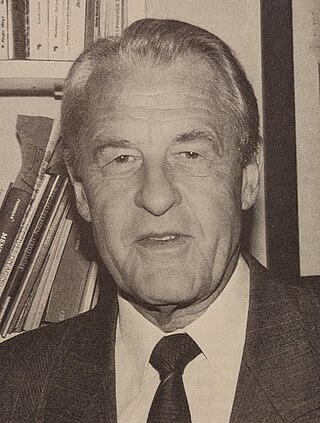Related Research Articles
Hartmut Erbse was a German classical philologist.

Adolf Arndt was a German politician of the Social Democratic Party (SPD) and former member of the German Bundestag.

Rolf Rendtorff (1925–2014) was Professor of Old Testament at the University of Heidelberg from 1963 to 1990. He has written frequently on the Hebrew Bible and was notable chiefly for his contribution to the debate over the origins of the Pentateuch.

Lars Michael Clausen was a German sociologist and professor at the University of Kiel.
Ernst Forsthoff was a German scholar of constitutional law and a leading theorist of administrative law.
Karl Albert Joseph Peters was a German expert in criminal law, criminal pedagogy and miscarriages of justice. He studied legal science in Königsberg, Leipzig and Münster.

The Swiss Criminal Code is a portion of the third part of the internal Swiss law that regulates the criminal code in Switzerland. The original version was created on 21 December 1937. It entered into force on 1 January 1942. Previously, criminal law had been a cantonal competency.

Eric Andreas Hilgendorf is a German professor of law and legal philosopher. He holds the Chair in Criminal Law, Criminal Procedure, Legal Theory, and Information and Computer Science Law at the University of Würzburg. Hilgendorf is one of Germany's most influential scholars in the field of criminal law, with special focuses on IT law as well as on artificial intelligence and law.

Reinhard Merkel is a professor in criminal law and philosophy of law and a retired West German swimmer. He competed at the 1968 Summer Olympics in the 200 m and 400 m individual medley and finished in sixth place in the latter event.
Hans Carl Nipperdey was a German labour law expert who worked as the president of the Federal Labour Court from 1954 to 1963. He was a controversial figure due to his close association with his complicit work with Nazi government from 1933, his membership of the Academy for German Law, and his work to systematise Nazi labour laws through his commentaries with Alfred Hueck.
Dieter Medicus was a German jurist. Until his retirement in 1994 he was professor of Private Law and history of Ancient law at the University of Munich.
Claus-Wilhelm Canaris was a German jurist. Until his retirement in 2005 he was professor of Private Law, Commercial law and Labour law the University of Munich.
Horst Schüler-Springorum was a German Professor of Jurisprudence. The focus of his work was on Criminal justice.
Dieter Nörr was a German scholar of Ancient Law. He studied at the Ludwig Maximilian University of Munich from 1949 to 1953. After receiving his doctorate with a dissertation on criminal law in the Code of Hammurabi, Nörr undertook postdoctoral study at the University of Heidelberg and the University of Rome. He worked for a year as a post-doctoral assistant at the Institute for Criminal Law and Legal Philosophy under Karl Engisch. He received his Habilitation at the University of Munich, under Professor Wolfgang Kunkel, in 1959 with a work on Byzantine Contract Law and was promoted to Privatdozent. He then accepted the Chair of Roman and Civil Law at the University of Hamburg. In 1960, Nörr became Full Professor at the University of Münster. After he declined positions at the Universities of Hamburg, Tübingen, and Bielefeld, he returned to the Ludwig Maximilian University of Munich as Professor, Chair of Roman Law, and Director of the Leopold Wenger Institute for Ancient Legal History and Papyrus Research. His brother, Knut Wolfgang Nörr, was also a Professor of Legal History, especially Canon Law, at the University of Tübingen.

Karl Engisch was a German jurist and a Philosopher of Law. He was described by Hans Joachim Hirsch as one of the "outstanding theorists of criminal justice of the [twentieth] century".
Günther Jakobs, is a German jurist, specializing in criminal law, criminal procedural law and philosophy of law.
Anne-Eva Brauneck became the first or second female (West) German professor of law in 1965. Brauneck studied law at the end of the Weimar Republic at the University of Heidelberg. She turned to studies on the family backgrounds of juvenile offenders. Her work was suspect to the National Socialists because it did not conform to the government mantras involving the "hereditary nature" of criminal proclivity.
Karl Friedrich Wilhelm Wander was a German pedagogue and Germanist. He published the largest existing collection of German-language proverbs.

Carl Joseph Georg Sigismund Wächter, from 1835 von Wächter, was a leading German jurist in the 19th century. For a brief period he served as president of the Oberappellationsgericht der vier Freien Städte.
Werner Flume was a German jurist and professor of Roman law, private law, tax law and a legal historian. He has significantly influenced the modern development of German private law and has been called a "lawyer of the century" for his contributions.
References
- ↑ "Prof. Dr. Dr. h.c. mult. Claus Roxin" (in German). Retrieved 2009-07-04.
- ↑ "Universität Augsburg: Strafrechtler Claus Roxin..." (in German). uni-protokolle.de. Archived from the original on 2016-03-03. Retrieved 2009-07-04.